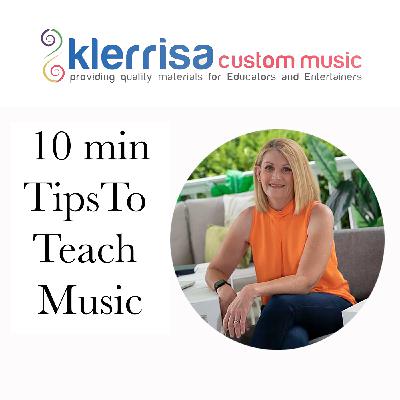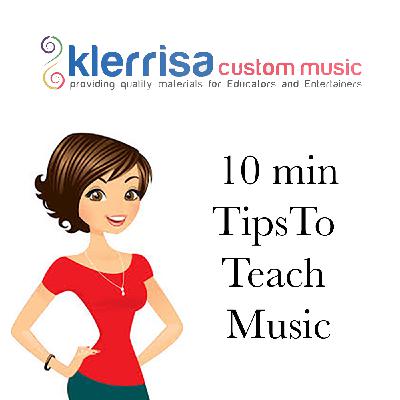Discover 10 Min Tips to Teach Music
10 Min Tips to Teach Music

10 Min Tips to Teach Music
Author: Kerri Lacey
Subscribed: 131Played: 172Subscribe
Share
© Copyright 2017 . All rights reserved.
Description
A music educational podcast designed to help teachers, students and people interested in learning a few more things about music theory, processes and the way music is structured. It comes with PDF or video support via my website Klerrisa Custom Music.
46 Episodes
Reverse
Podcast #46: Classroom Strategies - The Round Table Conference
10 Minute Tips to Teach Music
Epic Change starts with your environment. The thing is, your environment can influence your mood, behaviour, motivation, interactions with people, and stress levels.
Sometimes we get a little sick of the day to day life in classes. So, why not shake things up a little with the "Round Table Conference". I love using this particular classroom strategy and it is so simple. Take a listen and see how I use this simple tool.
Podcast #45: Class Starter Ideas - 10 Minute Tips to Teach Music
Epic Change starts with your environment. The thing is, your environment can influence your mood, behaviour, motivation, interactions with people, and stress levels.
We all know how difficult it can be to engage our students on a daily basis. How you start your lesson will affect the lesson experience. Today I will talk about the different ways you can start a class. Here are my top 5 and the reasons why I use them. Today's Take Away
Podcast #44: Part 8: Putting it all together.
10 Minute Tips to Teach Music
Epic Change starts with your environment. The thing is, your environment can influence your mood, behaviour, motivation, interactions with people, and stress levels.
So in this podcast, I tie up all the loose ends. I discuss a 5 year plan in action and provide you with a sample to take away. shorturl.at/aqwLQ
Podcast #43: Part 7: Three to Thrive
Welcome to Season 4 of 10 Minute Tips to Teach Music
Epic Change starts with your environment. The thing is, your environment can influence your mood, behaviour, motivation, interactions with people, and stress levels.
So in this podcast, I talk about how to find your “Three to Thrive”. Now I didn’t develop this term. It’s a Tony Robbins thing but I use it every term. What are the top three things on your capture list that are going to make the most impact? Take a listen and hear practical tips to help you with epic change. Link to free support: shorturl.at/akR45
Epic Change starts with your environment. The thing is, your environment can influence your mood, behaviour, motivation, interactions with people, and stress levels.
As Adults, we know this and we are very conscious of our environment particularly at home. So why should our classrooms be any different. Join me as I discuss Stage 2 of your 5 Year Plan toward Epic Change.
Some of the key talking points include:
Flexible teaching spaces and how best to manage the clutter
Tips on how best to organise your rooms
What is a Capture List?
How to break down the "mountain" the capture list creates
How to build your overall package of change
Click here for Podcast notes
To check out the post and give away attached to this episode, go to: Klerrisa Custom Music
Welcome to Episode 41 of 10 Min Tips to Teach Music.
So far you have learned that if you want to "Build the Music Department of Your Dreams", it all starts with YOU.
You and your teams strengths
Your departments culture
Your departments pillars of focus
Your ability to motivate and flip your "middle child"
Your teams desire to STAND OUT!
I know what you are thinking - so this is all great stuff but now what? Well, this is where we start to put words into action. It's time to create your 5 year plan. That's right! I am going to show you how to write a 5 year plan. In this episode, I talk about the advantages of creating a five year plan. I explain what a "situational analysis" is and how this can help you to get a clear perspective on your future goals. I also offer you a copy of a "Situational Analysis" template that you can use to help guide you through the first stages of your 5 year plan.
So strap yourself in and get ready for an awesome ride.
Hey everyone, this is the fourth episode of "How to Build the Music Department of Your Dreams". In this episode, I discuss how to "stand out". "Standing out" is a key ingredient in the development of your department. You need to do things differently and make sure people notice what your team does. I talk about different samples of how to stand out and offer tips that might be of use to you during your transformation.
Did you know that Music Departments have a "middle child" and that this is key to growing your department? In the third instalment of "How to Build the Music Department of Your Dreams", I discuss how you can actively engage that middle child to help build numbers in your music department elective stream.
Hey gang, Today's podcast continues with the series, "How to Build The Music Department of YOUR Dreams". In episode 2, I chat about how the culture of your department can help you to build the numbers involved. What are YOUR three pillars of success? How do they contribute to your overall vision?
To help guide you in your thinking, I have prepared a google form which asks you some questions. This should help clarify your thinking.
https://forms.gle/jC67RqmUQAiadpLZ7
In today's podcast, I share with you the first episode of a six part series discussing "How to Create the Music Department of Your Dreams". In the first of four episodes, I talk about how YOUR personality and YOUR strengths can greatly affect YOUR music department and how people view what goes on. I give you the opportunity to find out your own Enneagram Number and what your top 5 strengths might be.
To get the giveaway, go to: https://bit.ly/2rmLIkO
Well, I had a brain wave in class this week and I am so excited to share. I was teaching my Year 9 class about key signatures and found this incredibly cool way for the students to remember. It has a lot to do with the number 5 and the way you draw the letters. There is even a video showing you how to teach it.
Youtube Video: https://youtu.be/bqN2hu7SrRM
In this episode, I discuss the enneagram and your strengths. I talk about how these two tests can help you to understand yourself, and therefore make you more productive, engaging with your students and a valuable part of the team. I tell stories about specific cases and how this information has empowered others.
If you want to take the Strengths test: https://high5test.com?ref=10
If you want to take the Enneagram: https://www.truity.com/?an=kerri_827920
[Full Disclosure: These links are affiliate link and I will only receive compensation if you purchase through this link.]
During this podcast, I chat about the app Incredibox. I offer a breakdown of each version with a list of different strategies to work it into your classroom. For support materials, go to www.klerrisaucustommusic.com.au
Carousel Teaching - what on earth is it? In its simplest form, it is a cooperative learning strategy that involves movement, discussion and reflection. It is a bit like Gallery Walk (as named by Shelley Gray) where students work on their own to complete a series of tasks around the room or school environment. In a Carousel, they work in small groups and move from station to station. This podcast looks at strategies to use in a single classroom following this model. For support materials, go to www.klerrisacustommusic.com.au
Well today I want to talk about QR codes and how they can be useful in a number of areas. For supporting documentation, go to www.klerrisacustommusic.com.au
In the year I was born, 1967, Kraplus and Thier developed something they called the Learning Cycle. It was for the Science Curriculum Improvement Study. It was an inquiry based teaching approach that had 3 phases: Exploration, concept introduction and concept application. The idea was to explore the current situation, introduce the central concept and then apply the skill set. A lot like music classes - we teach a concept and then apply it to the skill set.
Since 1967, many different variations of this idea have been developed, all with the same idea - explore before introduction and application. A popular version of the Learning Cycle is the 5-E model--Engage, Explore, Explain, Elaborate, Evaluate (Bybee, 1997). This model adds Engage and Evaluate to bookend the process. Again a lot like music classes. Listen to the podcast to find out more.
For podcast support, go to: http://www.klerrisacustommusic.com.au
All teachers struggle with the dreaded “paper processes”. We have so many processes in our day to day life that trying to streamline can be quite scary. What if you miss something in the change over? That could prove to be catastrophic. So where does one start to become “paperless”. Well first of all, I truly don’t think you will ever be paperless but you can definitely reduce your reliance on some things to make life a little more streamlined. I am, and will always be, that teacher who has lists, but I don’t have to have heaps of post it notes around the place. So where did I start? Find out more in this episode.
For the podcast support information, go to http://www.klerrisacustommusic.com.au
Let’s face it, extra curricular ensembles are part and parcel of the Music Department in most schools. More often than not, teachers take on these ensembles out of the goodness of their hearts, with very little support. Some of us are fortunate and may receive a couple of periods a week to help with planning and preparation but most of us don’t get that much help. This week I would like to talk about the challenges of creating an ensemble, be it vocal or instrumental, and some of the strategies to ensure you are providing a development plan which also incorporates growth.
For the Podcast support, go to: http://www.klerrisacustommusic.com.au
The high school music classroom can be quite challenging. Each type of school structure comes with their challenges. There are some structures where music is only taught for 3 or 6 months in the year. There are other structures where music is taught all year but only once a week. Both have their success and their challenges. This week I would like to talk about the challenges of the mandatory structure and how to engage the stage 4 (years 7 and 8) to continue through to stage 5 (elective years 9 and 10) and then onto stage 6 (years 11 and 12).
For podcast notes, go to: www.klerrisacustommusic.com.au
This video explains a couple of different ways that you could start your music classes. It covers the countdown screen, time trials, The PB and what do you remember. To find the support materials, go to: www.klerrisacustommusic.com.au









